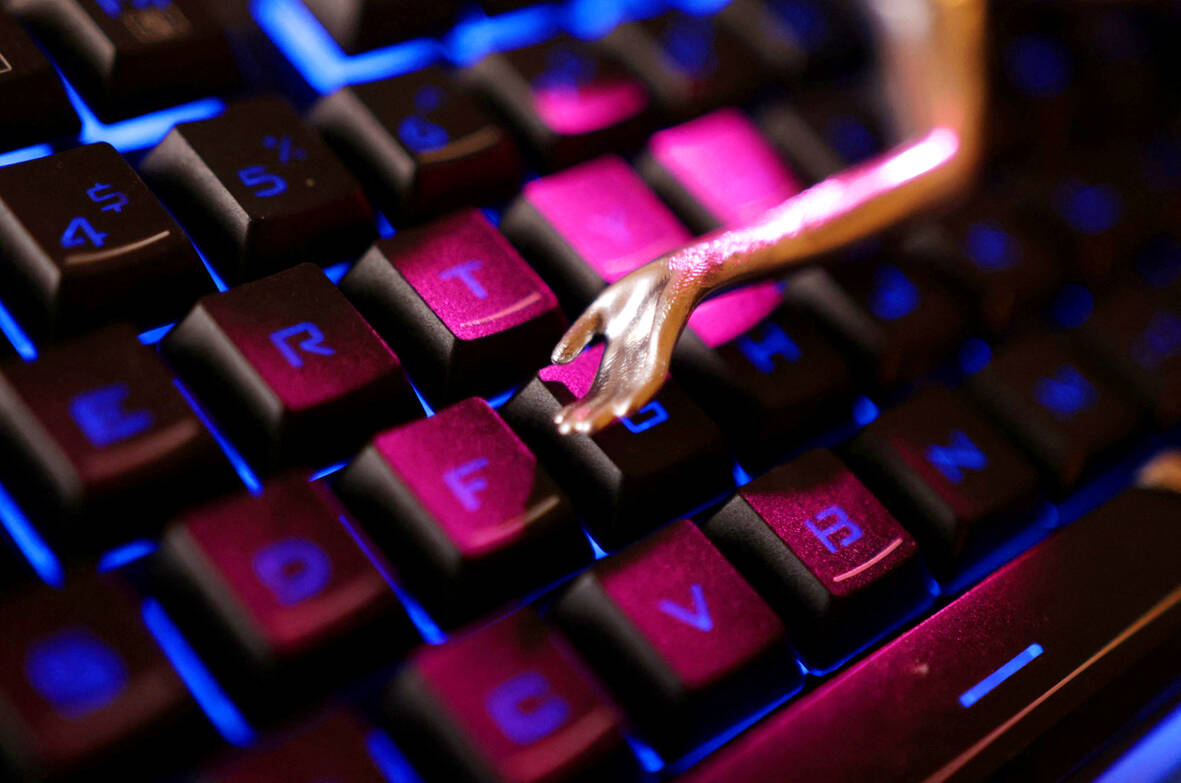Mental health counselor Nicole Doyle was stunned when the head of the US National Eating Disorders Association showed up at a staff meeting to announce the group would be replacing its helpline with a chatbot.
A few days after the helpline was taken down, the bot — named Tessa — would also be discontinued for providing harmful advice to people in the throes of mental illness.
“People ... found it was giving out weight loss advice to people who told it they were struggling with an eating disorder,” said Doyle, 33, one of five workers who were let go in March, about a year after the chatbot was launched.

Photo: AP
“While Tessa might simulate empathy, it’s not the same as real human empathy,” said Doyle.
The National Eating Disorders Association (NEDA) said that while the research behind the bot produced positive results, they are determining what happened with the advice given and “carefully considering” next steps.
NEDA did not respond directly to questions about the counsellors’ redundancies but said in emailed comments the chatbot was never meant to replace the helpline.

Photo: Reuters
From the US to South Africa, mental health chatbots using artificial intelligence are growing in popularity as health resources are stretched, despite concerns from tech experts around data privacy and counseling ethics.
While digital mental health tools have existed for well over a decade, there are now more than 40 mental health chatbots globally, according to the International Journal of Medical Informatics.
New York-based anthropology student Jonah has turned to a dozen different psychiatric medication and helplines to help him cope with his obsessive compulsive disorder (OCD) over the years.
He has now added ChatGPT to his list of support services as a supplement to his weekly consultations with a therapist.
Jonah had thought about talking to a machine before ChatGPT, because “there’s already a thriving ecosystem of venting into the void online on Twitter or Discord ... it just kind of seemed obvious”, he said.
Although the 22-year-old, who asked to use a pseudonym, described ChatGPT as giving “boilerplate advice”, he said it is still useful “if you’re really worked up and just need to hear something basic ... rather than just worrying alone.”
Mental health tech startups raised US$1.6 billion in venture capital as of December 2020, when COVID-19 put a spotlight on mental health, according to data firm PitchBook.
“The need for distant medical assistance has been highlighted even more by the COVID pandemic,” said Johan Steyn, an AI researcher and founder of AIforBusiness.net, an AI education and management consultancy.
An estimated one billion people worldwide were living with anxiety and depression pre-COVID — 82 percent of them in low and middle-income countries, according to the WHO.
The pandemic increased that number by about 27 percent, the WHO estimates.
Mental health treatment is also divided along income lines, with cost a major barrier to access.
Researchers warn that while the affordability of AI therapy can be alluring, tech companies must be wary of enforcing health care disparities.
People without internet access run the risk of being left behind, or patients with health insurance might access in-person therapy visits while those without are left with the cheaper chatbot option, according to the Brookings Institution.
PRIVACY AND PROTECTION
Despite the growth in popularity of chatbots for mental health support worldwide, privacy concerns are still a major risk for users, the Mozilla Foundation found in research published in May 2022.
Of 32 mental health and prayer apps, like Talkspace, Woebot and Calm, analysed by the tech non-profit, 28 were flagged for “strong concerns over user data management,” and 25 failed to meet security standards like requiring strong passwords.
Mozilla researcher Misha Rykov described the apps as “data-sucking machines with a mental health app veneer”, that open up the possibility of users’ data being collected by insurance and data brokers and social media companies. For example, mental health Woebot was highlighted in the research for “sharing personal information with third parties.”
Woebot says that while it promotes the app using targeted Facebook ads, “no personal data is shared or sold to these marketing/advertising partners,” and that it gives users the option of deleting all their data upon request.
The Mozilla Foundation has since reviewed its assessment in April, saying on its Web site that “after we published our review, Woebot reached out to us and open up a conversation to address our concerns.”
“The result of those conversations were updates to their privacy policy that better clarify how they protect their users’ privacy. So now ... we feel pretty good about Woebot’s privacy.”
AI experts have warned against virtual therapy companies losing sensitive data to cyber breaches.
“AI chatbots face the same privacy risk as more traditional chatbots or any online service that accept personal information from a user,” said Eliot Bendinelli, a senior technologist at rights group Privacy International.
In South Africa, mental health app Panda is due to launch an AI-generated “digital companion” to chat with users, provide suggestions on treatment and, with users’ consent, give scores and insights about users to traditional therapists also accessible on the app.
“The companion does not replace traditional forms of therapy but augments it and supports people in their daily lives,” said Panda founder Alon Lits.
Panda encrypts all backups and access to AI conversations is completely private, Lits said in emailed comments.
Tech experts like Steyn hope that robust regulation will eventually be able to “protect against unethical AI practices, strengthen data security, and keep healthcare standards consistent”.
From the United States to the EU, lawmakers are racing to regulate AI tools and pushing the industry to adopt a voluntary code of conduct while new laws are developed.
EMPATHY
Nonetheless, anonymity and a lack of perceived judgment are why people like 45-year-old Tim, a warehouse manager from Britain, turned to ChatGPT instead of a human therapist.
“I know it’s just a large language model and it doesn’t ‘know’ anything, but this actually makes it easier to talk about issues I don’t talk to anyone else about,” said Tim — not his real name — who turned to the bot to ward off his chronic loneliness.
Research shows that chatbots’ empathy can outweigh that of humans.
A 2023 study in the American JAMA internal medicine journal evaluated chatbot and physician answers to 195 randomly drawn patient questions from a social media forum.
They found that the bot’s answers were rated “significantly higher for both quality and empathy” compared to the physician’s.
Researchers deduced that “artificial intelligence assistants may be able to aid in drafting responses to patient questions”, not replace physicians altogether.`
But while bots may simulate empathy, this will never be the same as the human empathy people long for when they call a helpline, said former NEDA counsellor Doyle.
“We should be using technology to work alongside us humans, not replace us,” she said.

Jacques Poissant’s suffering stopped the day he asked his daughter if it would be “cowardly to ask to be helped to die.” The retired Canadian insurance adviser was 93, and “was wasting away” after a long battle with prostate cancer. “He no longer had any zest for life,” Josee Poissant said. Last year her mother made the same choice at 96 when she realized she would not be getting out of hospital. She died surrounded by her children and their partners listening to the music she loved. “She was at peace. She sang until she went to sleep.” Josee Poissant remembers it as a beautiful

For many centuries from the medieval to the early modern era, the island port of Hirado on the northwestern tip of Kyushu in Japan was the epicenter of piracy in East Asia. From bases in Hirado the notorious wokou (倭寇) terrorized Korea and China. They raided coastal towns, carrying off people into slavery and looting everything from grain to porcelain to bells in Buddhist temples. Kyushu itself operated a thriving trade with China in sulfur, a necessary ingredient of the gunpowder that powered militaries from Europe to Japan. Over time Hirado developed into a full service stop for pirates. Booty could

Before the last section of the round-the-island railway was electrified, one old blue train still chugged back and forth between Pingtung County’s Fangliao (枋寮) and Taitung (台東) stations once a day. It was so slow, was so hot (it had no air conditioning) and covered such a short distance, that the low fare still failed to attract many riders. This relic of the past was finally retired when the South Link Line was fully electrified on Dec. 23, 2020. A wave of nostalgia surrounded the termination of the Ordinary Train service, as these train carriages had been in use for decades

Lori Sepich smoked for years and sometimes skipped taking her blood pressure medicine. But she never thought she’d have a heart attack. The possibility “just wasn’t registering with me,” said the 64-year-old from Memphis, Tennessee, who suffered two of them 13 years apart. She’s far from alone. More than 60 million women in the US live with cardiovascular disease, which includes heart disease as well as stroke, heart failure and atrial fibrillation. And despite the myth that heart attacks mostly strike men, women are vulnerable too. Overall in the US, 1 in 5 women dies of cardiovascular disease each year, 37,000 of them